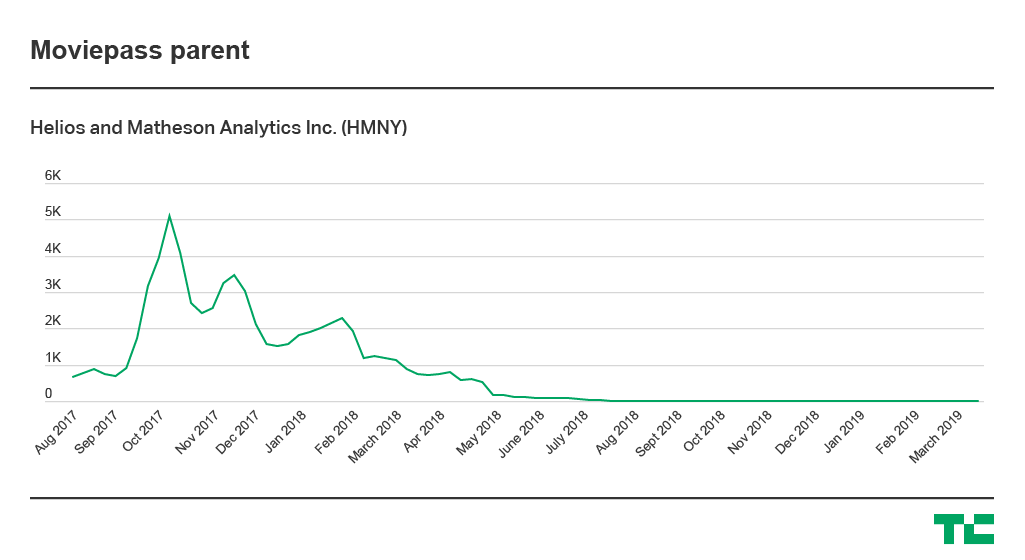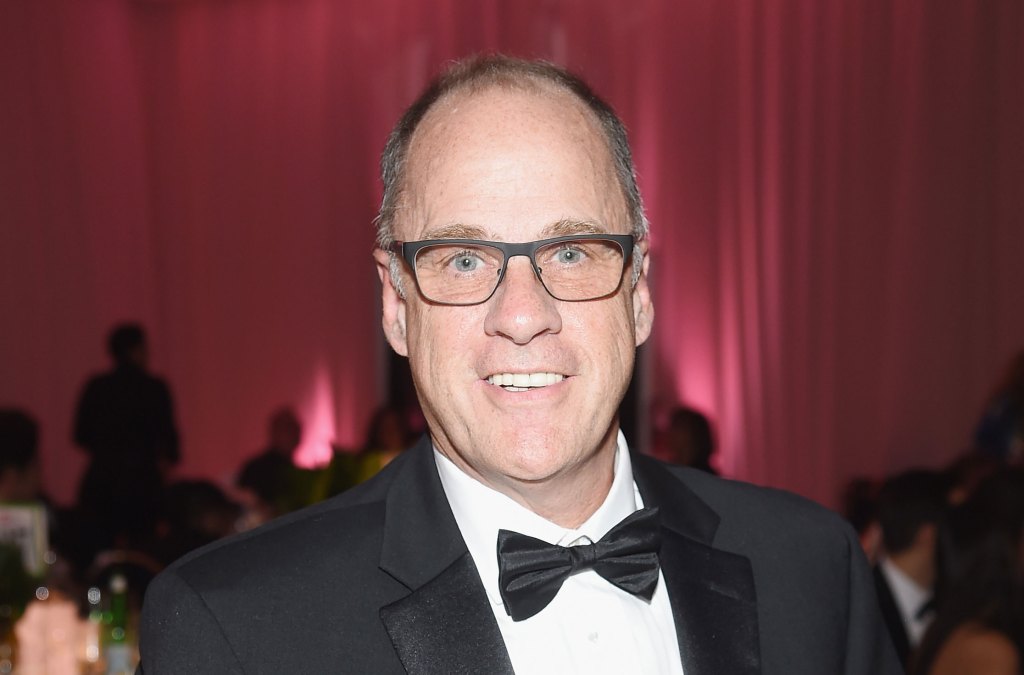In the space of a few months, MoviePass went from being the hottest startup on the block to a cautionary tale about growing too big, too fast.
By the time the summer of MoviePass came to an end, the company that was going to permanently disrupt the box office was hemorrhaging money. It changed its subscription plans repeatedly, while a service outage found its parent company, Helios and Matheson Analytics, asking creditors for a $5 million loan.
The company’s past year is littered with tales of woe, including funding the film “Gotti,” which earned the fabled 0 percent on review aggregator Rotten Tomatoes. But this week, MoviePass announced a return of sorts, with the launch of Uncapped, which brings back its unlimited subscription plan (with caveats).
Shortly after that news dropped, we sat down with Helios and Matheson CEO Ted Farnsworth to discuss the company’s rocky year, and how he intends to right the ship long after most have discounted MoviePass outright. We’ve already written up some of his more newsworthy remarks; now here’s a fuller (but still edited and condensed) transcript of what he told us.
TC: What is the status of the plan to spin-off MoviePass at this point? We last heard from you back in January.
TF: We filed our S-1, which is public information out there. And we’re continuing going full speed ahead.
TC: So what will Helios and Matheson look like moving forward?
TF: Helios and Matheson will still be obviously the largest shareholder of MoviePass. And then MoviePass Entertainment will be with MoviePass Films, MoviePass Subscription and Moviefone.
TC: Why does it make sense to spin-off?
TF: It makes sense from the standpoint of multiple reasons. One is because it will be a fully integrated entertainment company there. So if we plan to go forward and do any other acquisitions or whatever else we’re doing, really we’ll just focus on the entertainment side.
TC: Do you still view MoviePass as a good investment?
TF: Absolutely 100 percent, without a doubt. Because you created a household name, you changed the industry forever, even with AMC doing subscription and Cinemark doing subscription … even though they all said they would never do it, now they’re all doing it because you definitely changed the model. I think we grew obviously way too fast, where that was our problem in the technology side, being able to figure out people who were gaming the system or doing fraud on the system, sharing their codes. So I think now that we’ve relaunched the $9.95 Uncapped Plan, that’s where you really took six months to figure out on the technology side ways to really stop that from happening going forward.

TC: Gaming the system…was the primary source of the problem?
TF: Oh, yeah. They would share their code. You’d have one person going to 20 movies a month, 30 movies a month. Which you know and I know, as much as we like movies, most people aren’t going to 30 movies a month. And the way we figured that out into the system was when we started auditing people’s [accounts]. How many times did they change their device. When they take it and then they bring it back.
TC: So the primary fix you see on your end is kind of isolating those people and getting them off the system? Or how much of it is actually changing the fine print on the plans themselves?
TF: Even back then with all that abuse, 80 percent were just regular movie-goers. Your average movie-goer that would go to four movies a year, and you’re trying to get them to double to go to eight movies a year, right? So when you’re sitting here looking at that, it was the 20 percent that were the abusers that were ruining it for everybody else, from the standpoint of gaming the system or whatever. But I could go on … stories of people gaming the system. People use MoviePass to go to the restroom in Times Square.
TC: One of the complaints from consumers is that they felt like they had the rug pulled out from under them. The plans were constantly shifting. Is that going to continue to be the case moving forward?
TF: No. This plan was always the plan in the background of what you would move towards. But testing different plans, whatever it was, along the way. For instance, another issue is where people would go to the theater, they’ll pick up the ticket, they’ll hand their ticket to the kid or their child or their friend or whatever it is, they’ll go and watch the movie, and the person that’s paying the subscription goes back home or whatever they do. So now, even with our technology, we’ll be able to ping them inside the movie.
TC: You are actually tracking where people are?
TF: No, not tracking. When they go to log in to get a ticket, you have to do a location because you’ve got to know what theater they’re at. So as they do that, you’re gonna go ahead when the movie starts 30 minutes later, you’re able to ping them inside the theater, just to make sure they still are at that theater.
TC: What sends up a red flag? Is it just the sheer number of movies somebody’s going to in a month?
TF: It could be different things. It could be multiple locations. It could be multiple cities. It could be all kinds of different things. So those are all the algorithms that we’ve been building along the way.
TC: The new plan is unlimited with a caveat. What are the parameters?
TF: You have full inventory like the old days of what you’re able to go to, whether it’s a Marvel movie or whatever it is. And that’s what the people want. They don’t want curated movies. I also believe that even though we did caps … people don’t really look at caps.
TC: Looking back on what happened in the past year, do you feel that the company was transparent enough with consumers and shareholders while all this was going down?
TF: Absolutely. I think on the shareholder side, absolutely. I think our disclosures are way, way above and beyond, which is proven out over time, and I think on the consumer side you’re always transparent as fast as you could be on different things that were going on, but you’re right from the standpoint of, you’re growing so quick so fast.
TC: In order to actually be profitable if you are generating revenue with your own original content, what does the breakdown have to be? How many of your films do people with these passes have to go see in order for the whole thing to be profitable?
TF: Not as many as you’d think, because if you’re just profitable on the subscription side alone, you know, break-even and profitable on that, and then you have your movies on top of that as your ancillary revenues. For instance, some of the pre-sales and commitments that we already have on our movies, you’re already way ahead of the game, and then when you start tying it back to subscribers, how much does each subscriber drive as gross revenue? Right now, everybody looks at it as $9.95 or $14.95. Those numbers will jump dramatically for — I mean, coming up soon. Sooner than later.
TC: What kind of time are we talking about for the subscription side to actually become profitable?
TF: Oh, well, that’s interesting. It’s profitable right now. [A Helios and Matheson spokesperson later clarified that Farnsworth meant MoviePass’ subscription business is profitable on a revenue-per-subscriber basis.]
TC: When did it turn profitable?
TF: I will tell you this because this is out there, MoviePass has actually paid Helios back money over the last several months for loans that they have, so that gives you an idea of when we really started focusing on getting rid of the 20 percent of abuse.
TC: Are you able to disclose numbers for this new plan, as far as number of subscribers?
TF: Look, we’re extremely happy. We’re definitely well over 800 percent growth in the last few days. And that’s conservative.
TC: What are you doing beyond announcing this plan to actually win those people back?
TF: Well, a lot of them are coming back already that have canceled in the past, and we’ll be doing things you’ll see coming out even more and more, especially towards the ones that were loyal over time and really stuck it out over the last two years.
TC: What is the company’s relationship like with theaters at this point?
TF: We have good relationships with them, but the whole business model now is we don’t depend on them. We’re not looking at them from the revenue side, from the discount side, because you’re doing your own. You’ve got the subscription and your own original content, so that’s what we’re focused on.
TC: Does the relationship with the studios become problematic one you start producing your own films?
TF: No, because if you look at some of our past films, Lionsgate’s a distributor, Universal’s a distributor, so they’re making money on us now, so they’re even more open now to dealing with us because now all of a sudden they’re realizing that we’re one of their clients. So, if we use Lionsgate for distribution for one of our movies, we’ve got Universal trying to get the same deal, so it’s the opposite with the studio side. The studio side, we’ve got great relationships with them for sure.
TC: Last year things were looking rough and there was a point where the service went down and the company needed a pretty large investment. What were those conversations like with investors?
TF: I think if you look at our investors, the institutions, they’ve all done fine. I mean, they’re more than willing to invest in the next rounds of whatever they can do to invest, so I think the big snafu there was the credit card company, when one company sold to another company or whatever. We had done business with them for four years, so they decide that it’s too much credit for them and literally called the credit line on a Friday night and I do a personal guarantee on a Saturday. So, were the conversations interesting? Yeah, they were to say the least.

TC: What is Moviefone driving? What is the value proposition for you with it?
TF: We just brought on Matt [Atchity], who was the creator of Rotten Tomatoes … We’ll start doing more. We just engaged a very well-known person for Moviefone that will start doing all our red-carpet events.
TC: “Gotti” must have been a learning experience.
TF: Not really. Let me tell you why. Because we never looked at “Gotti” as a money-maker. They knew it would break-even or whatever, but they only projected that it would do $1.3 million in the box office here … Then when we pushed it with MoviePass, we took that up to $5 million. [Technically, $4.3 million.] So, I mean, when you can take a movie — I gotta be careful here, but when you take a movie that might not be that great or perfect, and you can move that needle, was always our theory of subscription.
TC: It sounds like you’re still optimistic about the theatrical business.
TF: Last year was the first time that theatrical was up in what, 20 years? Attendance, right? And then as we started going through our little snafus, you see numbers have dropped now. So I also think what’s interesting is, the industry was nervous to embrace you, and then all of a sudden when they thought maybe it was gonna go away, then all of a sudden they’re trying to embrace you. It’s like, wait a minute, maybe we do want them as part of the model. So I think, if you look at it overall, the whole ecosystem of theatrical, I don’t think that’s going anywhere at all. Because it’s like there’s certain people, and I think millennials for sure, they were never experiencing the theater side. Because they’re not gonna pay $15 a ticket, guy takes his girlfriend there or a young kid, and all of a sudden they’re spending 100 bucks on a night out going to the movies. Even though, it’s still the cheapest entertainment out there.
So with a subscription model, where it makes it more user-friendly, then they feel — it’s funny if you look at AMC’s quotes out there, from what’s going on with their subscription, consumption at the concession stands has doubled. We’ve been saying that all along. Because people feel if they’re there and they’re not putting money out of their pocket, they’re more free to spend money at the concession stand.
TC: Once the movie theaters realize that you might be going away, they’ve embraced you.
TF: They all know, the studios know the amount of tickets we’ve bought for certain movies. So if you’re buying 30, 40 percent of a movie nationwide, of a major studio … I think if you look back over the year of different points, different turning points, it was when they did the research report, it was Hollywood Reporter, and it was at CinemaCon. They did this research where we didn’t know about it, and they were putting it out at CinemaCon. Well, it came out, and it was raving reviews. It was: We were better than Netflix, we were better than Amazon, all these things. And talking about how people would listen to us 52 percent of the time [about] what theater to go to, all these different things.
So when that came out, when we saw it, of course we’re all happy to see how great the report is. And literally 15 minutes later, I’m like, boy has the gates of Hell just opened in Hollywood. These guys aren’t even a year old, and they have this kind of control over our box office. I mean, think about that from a technology standpoint. Think about that like from an Uber with a taxi service. Airbnb and the hotel industry. We’ve all lived through that. We all use it.
TC: You think MoviePass is disruptive in the same way that those businesses are?
TF: Oh my gosh, absolutely. We’ve proven it. We’ve changed the whole model forever. Where now, the No. 1 player in the world, AMC, is doing subscription. Even though they’ve said the whole time, ‘It won’t work, you can’t do subscription, it doesn’t work,’ blah blah blah, whatever … So in hindsight, would you do it differently, where MoviePass would have been private and then grow it and then go to an IPO? But we didn’t know … we thought it would do well.
TC: Would you have [kept it private]?
TF: In hindsight?
TC: Yeah.
TF: You’d probably sit there and build it up for a couple of years, without being under the microscope of everybody looking at every move you make. Because even when you look at Uber or whatever, they’ve had, over the years, their systems hacked or this, that and everything else … and it’s not that big of news, because you’re not under the microscope. We didn’t know that it was gonna grow as fast as it did.
TC: Were there any moments of doubt in the past year?
TF: No … There was no moments with me where I thought it would go down. Where it would just disappear. In my mind, it was too big to fail. Where you created a household name in less than a year.































Comment